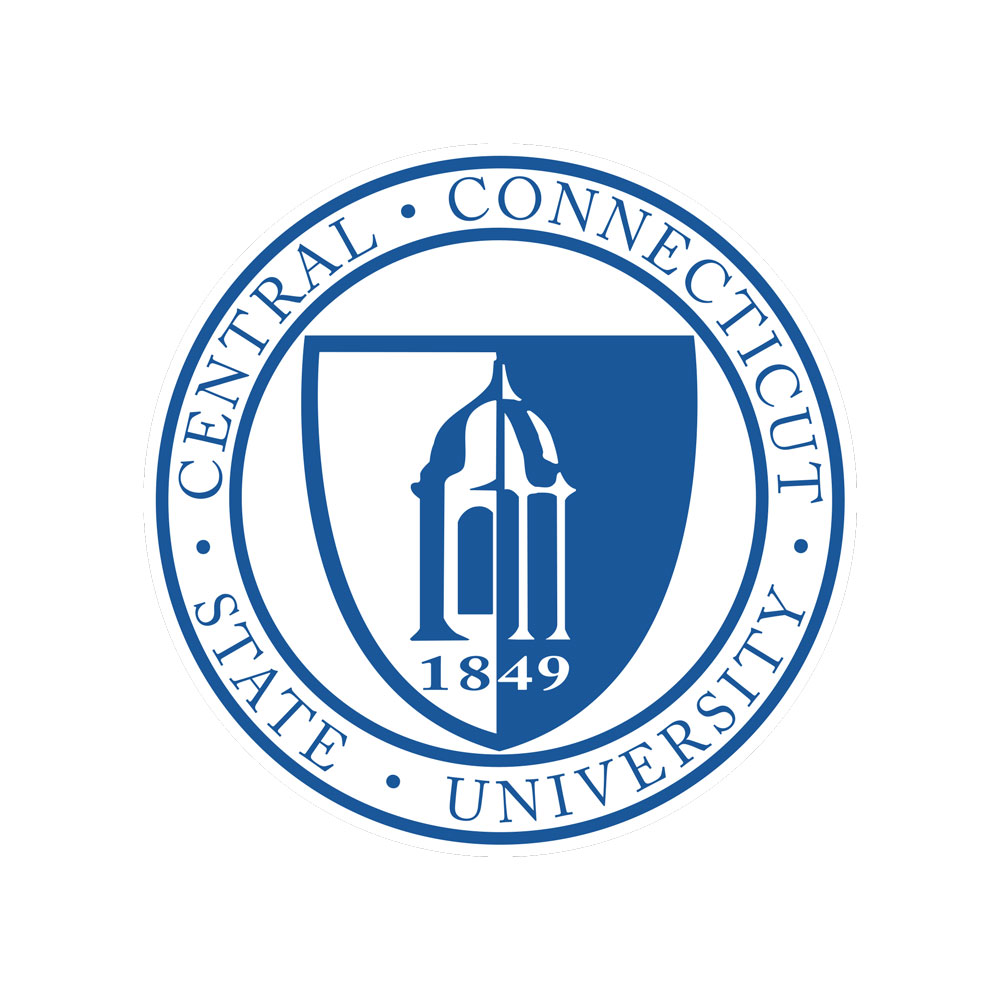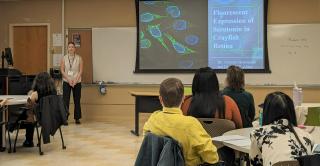
Connecticut State University System Policy Regarding Persons with Disabilities:
The Board of Trustees for the Connecticut State University System affirms its policy of nondiscrimination against all persons protected by all state and federal laws, regulations and executive orders. This policy of nondiscrimination commits the Connecticut State University System (CSU) to achieve equal employment opportunity and full participation for employees with disabilities. It is the Board's policy that no qualified person be excluded from consideration for employment, participation in any university or System Office program or activity, be denied the benefits of any university program or activity, or otherwise be subjected to discrimination with regard to any program or activity. This policy derives from CSU's commitment to nondiscrimination for all persons in employment, academic programs, and access to facilities, programs, activities, and services.
Existing barriers, whether physical, programmatic or attitudinal must be addressed. A person with a disability must be afforded equal employment opportunity as outlined in federal law, specifically the rehabilitation Act of 1973 including the section 504 and the Americans with Disabilities Act of 1990, as well as specific state laws on nondiscrimination found in the Connecticut General Statues and State Executive Orders 18, 11, and 9.
The ADA requires reasonable accommodation in all aspects of the employment process including application, performance of duties and benefits and privileges of employment. CSU's efforts to accommodate people with disabilities must be measured against the goal of full participation and integration. Services and programs to promote these benefits for people with disabilities shall complement and support, but not duplicate, each university's regular services and programs. In keeping with CSU's commitment to equal employment opportunity, each university will make reasonable accommodation for the known physical and mental limitations of otherwise qualified applicants and employees within the provisions of the prevailing state and federal statutes.
An employee with a disability seeking a reasonable accommodation should contact the university or System Office Affirmative Action Officer to determine the appropriate process for review of the request.
Achieving full participation and integration of people with disabilities requires the cooperative efforts of all of university and System Office departments, offices, and personnel. Each university and the System Office shall periodically review its compliance with this policy as part of its commitment to nondiscrimination.
The Connecticut State University System regarding Persons with Disabilities shall be made available to all employees and shall be posted prominently in meeting rooms used for university and related business meetings and on bulletin boards located in common areas which are readily accessible, on a daily basis, to Connecticut State University System employees and visitors.
Connecticut State University System Sexual Harassment Policy
SECTION 1. PURPOSE
The Connecticut State University System reaffirms and emphasizes its commitment to maintain a workplace and educational environment free from sexual harassment. Sexual harassment is reprehensible and subverts the mission of the university and will not be tolerated at the Connecticut State University System. It threatens the careers of employees, faculty and staff, and the educational experience of our students. The purpose of this policy is to prevent sexual harassment and to offer students and employees who believe they have been sexually harassed a means to redress any such claim with the goal of ending the harassment and providing an environment conducive to learning and working. Retaliation against an individual who complains about sexual harassment or who cooperates with an investigation of a complaint is unlawful and, if found to have occurred, will not be tolerated.
SECTION 2. STATUTORY AUTHORITY
Sexual harassment is prohibited by Title IX of the Education Amendments of 1972, Title VII of the Civil Rights Act of 1964, Section 46a-60 of the General Statutes of Connecticut and University policy. It is the intention of the CSU to take whatever appropriate action may be needed to prevent, correct, and if necessary, discipline behavior that violates this policy.
SECTION 3. POLICY STATEMENT
All members of the CSU community shall conduct themselves in an appropriate manner with concern, dignity and respect for others. The CSU community includes students, employees, and non-employees when they conduct business on CSU property.
Sexual harassment may occur between staff and staff, staff and student, or student and student. Complaints of sexual harassment within the Connecticut State University System will be taken seriously and investigated. Any member of the CSU community who violates this policy is subject to the full range of disciplinary action. Sexual harassment, in some instances, need not be intentional to violate this policy.
In the event of a charge of sexual harassment, a defense based upon consent will be given little weight when the facts establish an employee/student or supervisor/employee relationship existed. Since any significant power differential between members of the CSU community makes voluntary consent questionable, members of the faculty and staff are expected to be aware of their professional responsibilities and avoid apparent or actual conflict of interest.
An individual with a complaint concerning sexual harassment has a right to be heard. By means of these procedures, the CSU ensures an opportunity for an individual (Complainant), without fear of retaliation, to express a complaint and to seek a prompt and equitable resolution while protecting the rights of the person against whom the complaint has been filed. (Respondent). These procedures shall be available to any person who, at the time of the act complained of, was an employee, student, or applicant for employment or admission to the Connecticut State University System.
SECTION 4. DEFINITION OF SEXUAL HARASSMENT
"Any unwelcome sexual advance or requests for sexual favors or any conduct of a sexual nature when (1) submission to such conduct is made either explicitly or implicitly a term or condition of an individual's employment, (2) submission to or rejection of such conduct by an individual is used as the basis for employment decisions affecting such individual, or (3) such conduct has the purpose or affect of substantially interfering with an individual's work or academic performance or creating an intimidating, hostile, or offensive working environment." In an academic setting, sexual harassment would also include any unwelcome sexual advances or requests for sexual favors or any conduct of a sexual nature when submission to or rejection of such conduct by an individual might affect academic or personal decisions that are subject to the influence of the person making the proposal.
The law currently recognizes two forms of sexual harassment:
1. Quid Pro Quo
Unwelcome sexual advances, request for sexual favors and other verbal or physical conduct of a sexual nature when:
a. Submission to such conduct is made wither explicitly or implicitly a term or condition of an individual's academic work or employment; or
b. Submission to or rejection of such conduct by an individual is used as the basis of employment or academic decisions affecting such individuals; and
2. Hostile Environment
a. Such contact affects or interferes with an individual's work or academic performance or creates an intimidating, hostile or offensive academic or working environment. Hostile environment sexual harassment involves speech or conduct that is directed at someone because of their gender and/or is conduct of a sexual nature. Such speech or conduct includes but is not limited to unwelcome sexual advances, requests for sexual favors and other verbal or physical conduct or a sexual nature.
b. Such speech or conduct is reasonably regarded as offensive and substantially impairs the academic or work opportunity of students, colleagues or co-workers. This policy shall not be interpreted so as to constitute interference with academic freedom.
3. Gender Harassment
a. Gender harassment is a form of sexual harassment, which consists of discriminatory behavior towards an individual based on gender. It includes the use of sexist language, illustrations, examples and gestures that demonstrate discriminatory behavior. Sexually related conduct forms the basis of a sexual harassment claim if a reasonable person of the same gender would consider the actions sufficient to interfere unreasonably with the academic and/or employment performance of the Complainant.
SECTION 5. EXAMPLES OF SEXUAL HARASSMENT
While it is not possible to list all conduct which may constitute sexual harassment, the following are some examples of conduct which may constitute sexual harassment depending upon the totality of the circumstances, including the severity of the conduct and its pervasiveness. Examples of sexual harassment may include but is not limited to:
1. Direct or unwanted proposition of a sexual nature.
2. Direct or implied threats that submission to sexual advances is a condition of employment, promotion, or advancement in grades, letters of recommendation, scholarships, or any related matter.
3. A pattern of conduct intentionally intended and/or which has the effect of humiliating another that includes examples of the following: comments of a sexual nature, sexually explicit statements, questions, anecdotes, jokes, pictures, or other written materials.
4. A pattern of conduct that would humiliate another (using the reasonable person standard) which would include the following: Unnecessary touching, patting, hugging, or brushing against another's body, remarks of a sexual nature about a person's clothing or body, or remarks about sexual activity or speculations about sexual experiences.
SECTION 6. CONFIDENTIALITY
The Connecticut State University System is committed to taking corrective action when it becomes aware of a problem involving sexual harassment. Individuals are strongly encouraged to come forward with complaints regarding sexual harassment and to seek assistance from CSU officials. The CSU System cannot insure confidentiality upon receipt of a complainant of sexual harassment; however, dissemination of information relating to the case should be limited, in order that the privacy of all individuals involved is safeguarded as fully as possible to the extent permitted by law. The CSU System will enforce compliance with the non-retaliation provisions of this policy. A university or the System Office may proceed to investigate a complaint without the consent of the individual who originally filed the complaint.
The Student Affairs offices, Counseling Services or Women's Centers are available to provide assistance or referrals for individuals on the various CSU campuses who have complaints about sexual harassment. The designated administrators, counselors or staff members will support an individual with a concern regarding alleged sexual harassment to file a sexual harassment complaint but will, to the extent permitted by law, upon the individual's request, maintain the confidentiality of the information provided to the counselor.
SECTION 8. COMPLAINT PROCEDURES
The Connecticut State University System is committed to take reasonable care to prevent and correct any sexually harassing behavior or other forms of unlawful discrimination at the System Office and on its four university campuses. Complaints alleging a violation of this policy shall be resolved through established discrimination and sexual harassment procedures at each university and the System Office. Procedures for the handling of complaints involving claims of discrimination or sexual harassment are available through the Affirmative Action Officer at the university and the System Office. These procedures will allow for an informal resolution of the complaint. If the informal process is unsuccessful or if the Complainant wishes to bypass the informal process, he/she may file a formal complaint. Complaints should be lodged as soon as possible after the alleged incident, but not later than 180 days after said incident.
SECTION 9. ALTERNATIVE LEGAL REMEDIES
Nothing contained in the Policy is intended to deny any member of the Connecticut State University community the right to pursue other avenues of recourse in the event he/she believes that he/she has experienced sexual harassment. Such recourse may include filing charges with a state or federal enforcement agency, or initiating civil or criminal action under state and federal law.
SECTION 10. DISSEMINATION OF POLICY
This Policy shall be conspicuously posted in the System Office. Each university shall ensure its dissemination in accordance with established practice. This policy shall appear in the student handbook and faculty handbook and shall be reviewed periodically for compliance with state and federal law.
For Further Information About this Policy or Information regarding the Process for Filing a Complaint, Contact the Chief Diversity Officer



